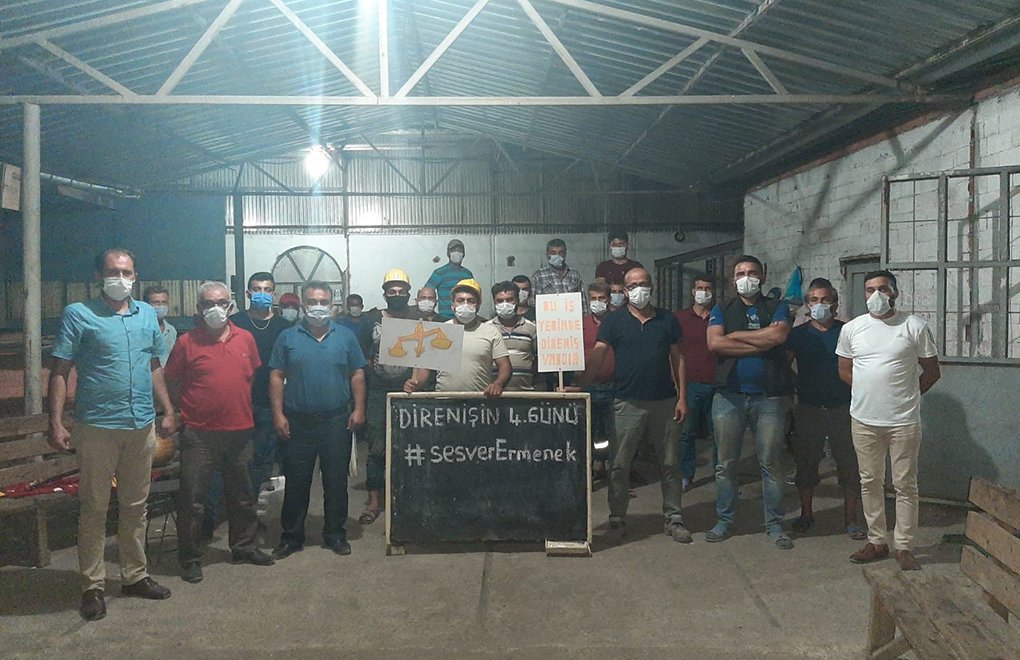Photo: Nakliyat-İş Union
Click to read the article in Turkish
The workers of a mining company in the central province of Karaman were dismissed despite a layoff ban due to the Covid-19 pandemic.
Workers of Cenne Lignite Mine have not been paid their salaries for 12 months and workers of Seba Mine have not been paid for seven months. Both companies are owned by Has Şekerler Mining.
CLICK - 40 miners are neither paid their wages, nor dismissed from their jobs
Because of being unable to receive their salaries, the workers have refrained from working for 12 days at Cenne company and for eight days at Seba company. Article 34 of No. 4857 Labor Law allows workers to refrain from working in case their salaries are not paid within twenty days of the day it was due.
The employer laid them off as per Article 29 of the Labor Law, which means they were fired because of a "behavior against the rules of morality and goodwill" and will not be able to receive severance pay or unemployment salary.
Releasing a statement on the firings, the Bağımsız Maden-İş union said that the layoff ban was "a big lie."
"State institutions and unions affiliated with the Hak-İş and the Türk-İş threaten our members, who have been resisting as per Article 34 of the Labor law because they have not been able to receive their salaries. The boss fires resisting workers, declaring them 'immoral'," said the union.
Seba Mining workers released a video statement today (September 11), saying that the employer paid their salaries after they started resisting. However, they said, they didn't only want their salaries to be paid but also their working conditions to be improved and to be able to work as unionized workers.
What does No. 4857 Labor Law say?Article 29 - Collective dismissal When the employer contemplates collective terminations for reasons of an economic, technological, structural or similar nature necessitated by the requirements of the enterprise, the establishment or activity, he shall provide the union shop-stewards, the relevant regional directorate of labour and the Public Employment Office with written information at least 30 days prior to the intended lay-off. A collective dismissal occurs when, a) in establishments employing between 20 and 100 employees, a minimum of 10 employees; and b) in establishments employing between 101 and 300 employees, a minimum of 10 percent of employees; and c) in establishments employing 301 and more workers, a minimum of 30 employees, are to be terminated in accordance with Article 17 on the same date or at different dates within one month. The said written communication shall include the reason for the contemplated layoff, the number and groups to be affected by the lay-off as well as the length of time the procedure of terminations is likely to take. Consultations with union shop-stewards to take place after the said notification shall deal with measures to be taken to avert or to reduce the terminations as well as measures to mitigate or minimize their adverse effects on the workers concerned. A document showing that the said consultations have been held shall be drawn up at the end of the meeting. Notices of termination shall take effect 30 days after the notification of the regional directorate of labor concerning the intended lay-offs. In the event of closing the entire establishment which involves a definite and permanent stoppage of activities, the employer shall notify, at least 30 days prior to the intended closure, only the regional directorate of labor and the Public Employment Office and shall post the relevant announcement at the establishment. If seasonal and campaign work layoffs are carried out in conjunction with the nature of such work, provisions on collective dismissals shall not apply. The employer shall not apply the provisions on collective dismissal to evade and prevent the application of Articles 18,19,20 and 21; otherwise, the employee may file suit according to these articles. Source: turkishlaborlaw.com https://turkishlaborlaw.com/turkish-labor-law-4857/19-4857-labor-law-english-by- Article 34 - Non-payment of wages on the day due The employee whose wage has not been paid within twenty days of the day it was due, except for force majeure, may refrain from fulfilling his obligation to work. Even if refraining from work by employees based on their personal decisions takes on the character of concerted action in quantifiable terms, it shall not qualify as a strike. The highest interest rate charged to bank deposits shall be levied on wage debts not paid on the day they were due. Employment contracts of such employees shall not be terminated solely because they have refrained from working for this reason; no replacements shall be hired, nor may such work be performed by others. Source: Turkish Labor Law |
(HA/VK)

